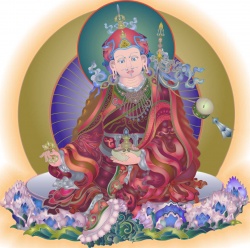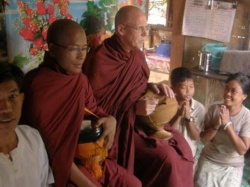Difference between revisions of "Sanskar ceremonies"
(Created page with " Sanskar is a religious rite in Sikhism which take place at an important stage in ones life. For a person to attain various worldly goals s/he mu...") |
|||
| Line 1: | Line 1: | ||
| + | <nomobile>{{DisplayImages|1560|637|1338|2204}}</nomobile> | ||
| Line 5: | Line 6: | ||
| + | [[Sanskar]] is a [[religious rite]] in [[Sikhism]] which take place at an important stage in ones [[life]]. For a [[person]] to attain various [[worldly]] goals s/he must go through various {{Wiki|ceremonies}} at certain times in his or her [[life]]. The {{Wiki|ceremonies}} that takes place at these critical stages of [[life]] are called [[sanskars]]. | ||
| − | + | The {{Wiki|Sikhs}} have 4 main [[Sanskars]] or {{Wiki|ceremonies}} in [[life]]. They are: | |
| − | |||
| + | [[Naam Karan]] – This is a [[Sikh]] {{Wiki|ceremony}} of naming a child and it usually takes place in a [[Gurdwara]] ([[Sikh]] place of {{Wiki|worship}}) after the baby and mother are medically and {{Wiki|physically}} fit to attend the [[Gurdwara]]. | ||
| − | + | There is no limit or threshold to this timing and the [[family]] should not [[feel]] undue pressure of any kind as to the timing. The only matters that need to be taken into account is the well being of the mother and child. | |
| + | Normally this {{Wiki|ceremony}} only involves the main [[family]] members attending the local [[Gurdwara]]. | ||
| − | |||
| + | {{Wiki|Amrit Sanskar}} or [[Amrit Sanchar]] or the [[Amrit ceremony]] is the [[Sikh]] {{Wiki|ceremony}} of [[initiation]] or baptism. This practice has been in [[existence]] since the times of [[Guru Nanak]] Dev (1469 - 1539). | ||
| − | + | During that time-period, this {{Wiki|ceremony}} was known as [Charan Amrit]] or [[Charan Phul]] or the [[Pag Pahul]]. | |
| + | However in 1699, the [[Khande di Pahul]] ([[Amrit ceremony]]) was [[initiated]] by {{Wiki|Guru Gobind Singh}} when [[Khalsa]] was inaugurated at [[Sri Anandpur Sahib]] on the day of [[Baisakhi]]. | ||
| − | Antam Sanskar – The [[funeral]] {{Wiki|ceremony}} ([[cremation]]): In [[Sikhism]] [[death]] is considered a natural process and [[God's]] will or Hukam. To a [[Sikh]], [[birth]] and [[death]] are closely associated, because they are both part of the cycle of [[Wikipedia:Human life|human life]] of "coming and going" ( | + | "[[Khande Di Pahul]]" [[embodies]] the primary [[objects]] of [[Sikh]] [[faith]]; promises connection with the [[Guru]]; and also promotes the ability to lead a [[pure]] and pious [[life]] which will unite the "[[pure]] one" with Almighty Lord. |
| + | |||
| + | |||
| + | [[Anand Karaj]] – is the [[name]] of the [[Sikh]] [[Marriage]] {{Wiki|ceremony}}, meaning "[[Blissful]] Union" or "[[Joyful]] Union," which was introduced by [[Guru]] Amar Das. | ||
| + | |||
| + | The four [[Lavan]] (marriage hymns which take place during the [[marriage]] {{Wiki|ceremony}}) were composed by his successor, [[Guru]] [[Ram Das]]. | ||
| + | |||
| + | It was originally legalised in [[India]] through the passage of the [[Anand]] [[Marriage]] Act 1909 but is now governed by the [[Sikh]] Rehat Maryada ([[Sikh]] code of conduct and conventions) which was issued by the [[Shiromani Gurdwara Prabandhak Committee]] (SGPC). | ||
| + | |||
| + | It dictates that only those who follow the [[Sikh]] [[religion]] may marry under the {{Wiki|ceremony}}, therefore, {{Wiki|Sikhs}} cannot marry persons professing to other [[religions]] under it. | ||
| + | |||
| + | It also states that child [[marriage]] is invalid and that no account should be taken of the prospective spouse's [[caste]]. However, in practice, many {{Wiki|Sikhs}} take preference in [[people]] from their [[caste]]. | ||
| + | |||
| + | |||
| + | [[Antam Sanskar]] – The [[funeral]] {{Wiki|ceremony}} ([[cremation]]): In [[Sikhism]] [[death]] is considered a natural process and [[God's]] will or Hukam. To a [[Sikh]], [[birth]] and [[death]] are closely associated, because they are both part of the cycle of [[Wikipedia:Human life|human life]] of "coming and going" | ||
| + | |||
| + | ([[ਜਾਣਾ]] , [[Aaavan Jaanaa]]) which is seen as transient stage towards [[Liberation]], | ||
| + | |||
| + | , [[Mokh Du-aar]]) complete {{Wiki|unity}} with [[God]]. {{Wiki|Sikhs}} thus believe in [[reincarnation]]. | ||
| + | |||
| + | The [[soul]] itself is not [[subject]] to [[death]]. [[Death]] is only the progression of the [[soul]] on its journey from [[God]], through the created [[universe]] and back to [[God]] again. | ||
| + | |||
| + | In [[life]], a [[Sikh]] tries always to constantly remember [[death]] so that he or she may be sufficiently prayerful, [[detached]] and righteous to break the [[cycle of birth and death]] and return to [[God]]. | ||
{{R}} | {{R}} | ||
https://www.sikhiwiki.org/index.php/Sanskar | https://www.sikhiwiki.org/index.php/Sanskar | ||
[[Category:]] | [[Category:]] | ||
Latest revision as of 01:01, 5 December 2015
Sanskar is a religious rite in Sikhism which take place at an important stage in ones life. For a person to attain various worldly goals s/he must go through various ceremonies at certain times in his or her life. The ceremonies that takes place at these critical stages of life are called sanskars.
The Sikhs have 4 main Sanskars or ceremonies in life. They are:
Naam Karan – This is a Sikh ceremony of naming a child and it usually takes place in a Gurdwara (Sikh place of worship) after the baby and mother are medically and physically fit to attend the Gurdwara.
There is no limit or threshold to this timing and the family should not feel undue pressure of any kind as to the timing. The only matters that need to be taken into account is the well being of the mother and child.
Normally this ceremony only involves the main family members attending the local Gurdwara.
Amrit Sanskar or Amrit Sanchar or the Amrit ceremony is the Sikh ceremony of initiation or baptism. This practice has been in existence since the times of Guru Nanak Dev (1469 - 1539).
During that time-period, this ceremony was known as [Charan Amrit]] or Charan Phul or the Pag Pahul.
However in 1699, the Khande di Pahul (Amrit ceremony) was initiated by Guru Gobind Singh when Khalsa was inaugurated at Sri Anandpur Sahib on the day of Baisakhi.
"Khande Di Pahul" embodies the primary objects of Sikh faith; promises connection with the Guru; and also promotes the ability to lead a pure and pious life which will unite the "pure one" with Almighty Lord.
Anand Karaj – is the name of the Sikh Marriage ceremony, meaning "Blissful Union" or "Joyful Union," which was introduced by Guru Amar Das.
The four Lavan (marriage hymns which take place during the marriage ceremony) were composed by his successor, Guru Ram Das.
It was originally legalised in India through the passage of the Anand Marriage Act 1909 but is now governed by the Sikh Rehat Maryada (Sikh code of conduct and conventions) which was issued by the Shiromani Gurdwara Prabandhak Committee (SGPC).
It dictates that only those who follow the Sikh religion may marry under the ceremony, therefore, Sikhs cannot marry persons professing to other religions under it.
It also states that child marriage is invalid and that no account should be taken of the prospective spouse's caste. However, in practice, many Sikhs take preference in people from their caste.
Antam Sanskar – The funeral ceremony (cremation): In Sikhism death is considered a natural process and God's will or Hukam. To a Sikh, birth and death are closely associated, because they are both part of the cycle of human life of "coming and going"
(ਜਾਣਾ , Aaavan Jaanaa) which is seen as transient stage towards Liberation,
, Mokh Du-aar) complete unity with God. Sikhs thus believe in reincarnation.
The soul itself is not subject to death. Death is only the progression of the soul on its journey from God, through the created universe and back to God again.
In life, a Sikh tries always to constantly remember death so that he or she may be sufficiently prayerful, detached and righteous to break the cycle of birth and death and return to God.
Source
https://www.sikhiwiki.org/index.php/Sanskar [[Category:]]



